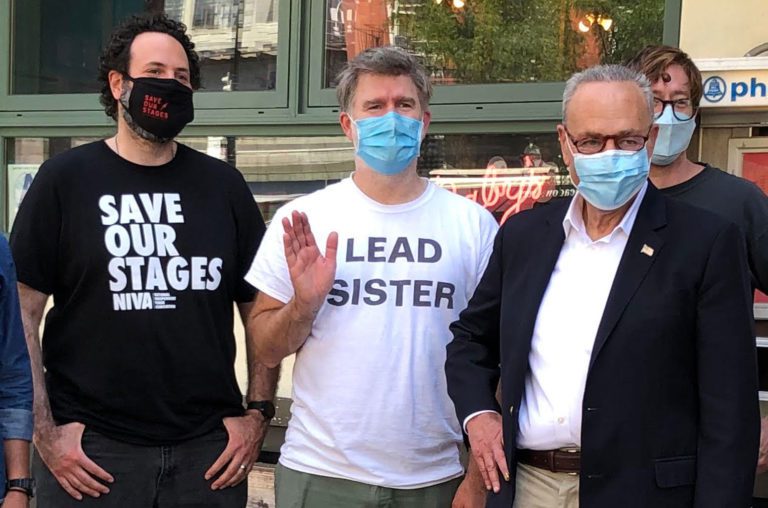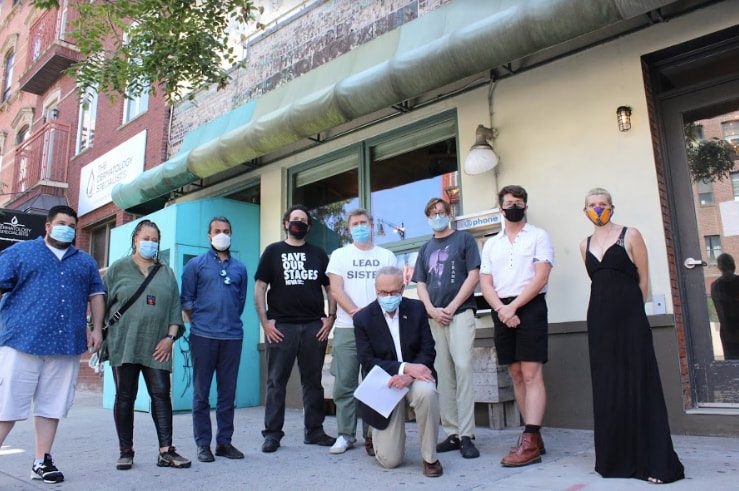
Arts and entertainment venues have been among the hardest hit, and few have suffered like the Sweetwater Music Hall, Throckmorton Theatre and Marin Theatre Company.
“I don’t know when we’re going to be a full business again,” Sweetwater General Manager Madison Flach told us in May. “Right now, it’s just about trying to stay hopeful, be pragmatic and make plans for a variety of different scenarios.”
Since that time, Flach and her close-knit team of employees launched a short-lived Summer Pop-Up Tiki Bar for food and beverage takeout featuring live music. That pop-up went pop quickly because of a variety of factors, namely the inability to allow people to gather to hear the music, as well as the City of Mill Valley’s long-planned Downtown Project, which brought considerable noise and dust to the area around the Sweetwater.
Live music and theatrical venues are in a particularly bad spot, as Gov. Gavin Newsom and, more locally, Marin County Public Health Officer Matt Willis, have indicated that live music and entertainment will be among the last sectors of the local economy to return. To make matters worse, while businesses across the country have filed insurance claims for losses related to the pandemic, claims filed by arts groups have been met with “a torrent of denials, prompting lawsuits across the country and legislative efforts on the state and federal levels to force insurers to make payments,” according to the New York Times. The insurance industry has argued that its policies never promised this kind of coverage in the first place and that fulfilling all of these requests would bankrupt the industry.
“This is an existential crisis,” Dayna Frank, the owner of First Avenue in Minneapolis, a regular spot for Prince, the Replacements and Hüsker Dü that opened in 1970, told the New York Times in May. “Independent venues have no financial backstop. We do not have corporate parents. There are no financial resources we can turn to.”
Flach and her team have taken solace in the idea that some of the most famous music venues in the United States are in the same exact situation. They’re joined by more than 1,300 venues and promoters for the likes of Bill Graham Civic Auditorium, the Fox Theater in Oakland, 9:30 Club in Washington, D.C. and World Cafe Live in Philadelphia in forming the National Independent Venue Association (NIVA). The organization retained powerhouse lobbying firm Akin Gump Strauss Hauer & Feld to seek tax relief and more flexible loan programs.
 Front Row: U.S. Senate Minority Leader Charles Schumer Back Row (Left to Right): Cris Italia – The Stand, Grace Blake – Iridium, Dhruv Chopra – Elsewhere, Rev. Moose – NIVA Executive Director, James Murphy – Lead Singer of LCD Soundsystem, Billy Jones – Baby’s All Right, Sean McVerry – Independent Artist, Kae Burke – House of Yes. Courtesy image.
Front Row: U.S. Senate Minority Leader Charles Schumer Back Row (Left to Right): Cris Italia – The Stand, Grace Blake – Iridium, Dhruv Chopra – Elsewhere, Rev. Moose – NIVA Executive Director, James Murphy – Lead Singer of LCD Soundsystem, Billy Jones – Baby’s All Right, Sean McVerry – Independent Artist, Kae Burke – House of Yes. Courtesy image.
Despite that effort, NIVA has struggled to turn that argument into action from U.S. Congress, specifically inclusion of federal funding for independent music venues within a third coronavirus relief package for businesses and unemployed Americans devastated by the impact of the coronavirus, which Congress was unable to pass before they went on recess earlier this month.
At a press conference this month announcing support for bipartisan legislation aimed at providing relief to independent live venues, promoters and festivals, Senate Minority Leader Chuck Schumer (D-NY) said he hoped to change that. He was joined by NIVA Executive Director Rev. Moose and LCD Soundsystem front man James Murphy to show support for the Save Our Stages Act, a bipartisan relief package for venues and indie music presenters. Introduced by Sens. John Cornyn (R-TX) and Amy Klobuchar (D-MN), the Save Our Stages Act would provide grants to independent live music venues, festivals, promoters and agencies that have lost nearly 100 percent of their revenue since the pandemic. A companion bill in the House is led by U.S. Reps. Peter Welch (D-VT) and Roger Williams (R-TX).
Indie venues “are places that occupy parts of cities that nobody wants to be in when they start,” Murphy said. “They fill in the gaps and communities spring up around them. They take those warehouses that nobody wanted to be in and they build places that foster the most diverse music scene in the world.”
Letting hundreds of venues go out of business would be a huge cultural loss for the country, Murphy says, noting “we’re not going to be able to rebuild these from zero. You can’t knock out all the mom and pops and think that more mom and pops will spring up. If we knock them out, it’s just chains.”
Schumer said independent venues, “like theaters and concert halls, are the beating heart of New York’s cultural life and a driving force in the economy,” adding, “that’s why it’s so important to provide dedicated federal assistance to independent venues so when it is safe, we can gather again for music, comedy, theater and other live performances in venues that have been around for generations.”
“These mom and pop venues are unable to fully reopen until well into 2021 due to safety concerns posed by large gatherings,” Rev. Moose said. “These institutions draw most of their revenue from acts that tour the United States, and until it’s safe to gather people en masse, it won’t be possible for venues to bring back their staff.”
Save our Stages would provide Small Business Administration grants equal to at least six months of financial support to pay employees and cover expenses like rent and utilities.
To date, those concerned with saving independent venues have sent 1.8 million emails to their elected officials through SaveOurStages.com.
Want to help generate support for the Save Our Stages Act? Go to www.saveourstages.com to tell your elected officials that you care about your local independent venues like the Sweetwater Music Hall, Throckmorton Theatre and Marin Theatre Company, and want them to get assistance until they can reopen safely.
